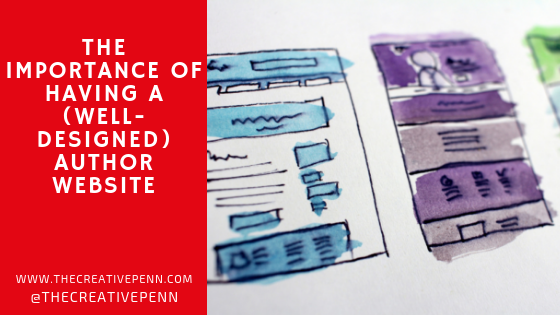Web design is about more than just looks; it’s also about function.
 Your website’s design can potentially make or break you, so I’m here to help you succeed. I even have some tips for you at the end.
Your website’s design can potentially make or break you, so I’m here to help you succeed. I even have some tips for you at the end.
Before we get into the design side of things though, let’s start with the need for an author website at all.
Why is having an author website crucial?
1. Lets you shine
Your author website is all about you. Who you are, what you do, what you’ve written, and the list goes on.
You’re not fighting for space and attention from other people like on social media, and you don’t have to worry about a new algorithm getting in the way of people seeing your posts. Your website is yours and no one else’s—you have the control.
It’s a place to let you shine and show readers why they should read your book(s). It builds your brand in a much bigger way than you can on social media, which is only a small portion of space.
To be clear, I’m not hating on social media. It’s an excellent way to spread your message and create connections, but not the only way. Social media is like the extra toppings on a frozen yogurt, where a website is the yogurt. The toppings are great, but you need a solid base.
That yogurt base is customized with the type of yogurt you prefer and your favorite fruits. Your website is customized with the look and feel you want that compliments your book(s) and shows your personality.
2. Is the nucleus
 Speaking of being a base, your website is the central area of your online presence. When people try to find someone online, they’re typically looking for the person’s website. A website that, after reading through, the user can be directed to the person’s social media pages.
Speaking of being a base, your website is the central area of your online presence. When people try to find someone online, they’re typically looking for the person’s website. A website that, after reading through, the user can be directed to the person’s social media pages.
Even if you’re starting from social media, people will often want to be directed to your website to learn more about you.
3. Is a marketing tool
Your website is one of many marketing tools to help bring in new readers. Having a website alone with no other marketing isn’t going to increase sales, but having a social media presence to bring people to your website is a good step.
As is creating an email list that people can join from your website. So is meeting people at events, where you share your business card with your website on it for them to learn more or remember to look you up. And people who find you on Amazon, for example, can go visit your website to learn more about you and your book if they’re on the fence.
Notice a pattern? Your website is vital.
4. Gives you a professional edge
Having a website makes you look professional. Think of your website as a business site (which in all honesty, it is).
When you look up a business, seeing a website immediately gives you the sense that they’re legit. Or at least are doing a darn good job of appearing that way if it’s well-designed. Websites increase trust and provide important information about the business that you won’t find elsewhere.
As an author, you’re selling yourself and your books. Give people a reason to want to keep scrolling through your website and reel them in to buy your book. Heck, you can even sell your book on your own website and earn more profit.
Seeing you as a professional in the field makes readers want to read what must be an amazing book, judging by your website design and info.
The effects of poor web design
Now, what happens if your website is poorly designed? Rather than nothing occurring, there are negatives that will likely show up.
 People view websites in a similar way they view book covers. If it leaves them with a not-so-nice first impression, it can turn them away. It may give the appearance that you’re unprofessional and that if you don’t put much effort into your site, perhaps you put the same effort into your books. Poor web design loses users’ trust.
People view websites in a similar way they view book covers. If it leaves them with a not-so-nice first impression, it can turn them away. It may give the appearance that you’re unprofessional and that if you don’t put much effort into your site, perhaps you put the same effort into your books. Poor web design loses users’ trust.
A site that’s difficult to navigate or is missing crucial information just confuses the user. You want them to not have to think.
Good web design is all about creating a site that a user ‘gets’. They don’t question why certain things are where they are, or why important pieces of information seem to be missing. The average person may not even notice if a website is well-designed, but you bet they’ll notice if it’s poorly designed.
Basically, many of the positives of having an author website diminish or disappear if the site is poorly designed. Don’t let that frozen yogurt melt away and make the toppings soggy.
How to craft a well-designed website
You’re probably wondering, how do I make my website well-designed? There are a couple options.
 1. You could go the DIY route, but be sure to keep things very simple. It may not be the most spectacular website, but it could get the job done. [Note from Joanna: click here for a step-by-step tutorial on setting up your own author website.]
1. You could go the DIY route, but be sure to keep things very simple. It may not be the most spectacular website, but it could get the job done. [Note from Joanna: click here for a step-by-step tutorial on setting up your own author website.]
2. The other option is to hire a designer, which does cost money, but as long as you hire someone who knows what they’re doing, you can have a site that reaps all the benefits of a well-designed website.
If you’re going the DIY route, there are certain things you’re going to want to consider and include when designing. This is in addition to choosing a domain name, host, platform, etc.
9 significant points to consider when designing your site:
- The look and feel of your site should reflect you and your book(s)
- Be sure it is easy to navigate
- Highlight your most recent book
- Ensure it’s responsive so that it works on all screen sizes and browsers
- It’s beneficial to have an accessible website, so those with visual impairments can still access the content
- Implementing SEO strategies can help your site rank higher in search engines and gain more organic viewers
- Have someone, such as a friend or professional, look over your written content for proper grammar and spelling
- Keep things clean and simple
- Keep a balance between written content and images
6 essentials to include on your site:
- Key pages – a page about you (the author), a page about your book(s), a contact page, a
privacy policy page - Additional pages that should be thought about – a blog, an event page, a media page
- Features such as a newsletter (preferably with an opt-in offer such as a free chapter), endorsements from influencers, reader reviews, and awards
- Links to where readers can purchase your book(s)
- Links to social media
- Call-to-actions (buttons such as ‘Learn more about my book’) that grab readers’ attention
I haven’t incorporated everything you need to consider and include into the above lists, as that would be exponentially longer and go into great detail. What I have given you are the basics to ensure you’re not missing crucial points, like links to where people can purchase your book—yes, I’ve come across this problem more than a few times with author websites.
Hopefully, you can now see the value in having an author website, especially a well- designed one.
Do you have an author website? What made you decide to create one or have it designed for you? Please leave your thoughts below and join the conversation.
 Michelle Balge is an author and web designer living near Toronto, Canada. Her memoir, titled A Way Out, features her journey through, and overcoming, severe depression and social anxiety. She is now a freelance web designer at Worth It Designs, creating beautiful and functional websites for authors, those in the mental health field, and more.
Michelle Balge is an author and web designer living near Toronto, Canada. Her memoir, titled A Way Out, features her journey through, and overcoming, severe depression and social anxiety. She is now a freelance web designer at Worth It Designs, creating beautiful and functional websites for authors, those in the mental health field, and more.
[Watercolour image courtesy Hal Gatewood and Unsplash. Messy paint image courtesy Ricardo Viana and Unsplash.]
